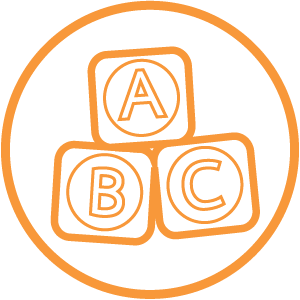
Infants &Toddlers
(Birth - 2 years old)
Families play a critical role in helping to reestablish a sense of normalcy and safety for a child before, during and after a disaster occurs. Please take a moment to read through these suggestions on how to support your child.
My Milestones
- Our Bond: Every day my attachment to you is growing. Please let me stay with you and people that I know well.
- Learning Constantly: I am learning about the world through everything I do: looking, listening, touching, mouthing or chewing, smelling, moving, and playing.
- Mimicking: I like to copy your facial expressions and interact with you and other people.
- Strong Muscles: When I play, my movement, muscle strength, and control increase. I need tummy-time when I am awake and opportunities to move, wiggle, crawl, stand, walk, etc. Please remember that I should not be placed on my tummy when I am put in my crib.
- How I Communicate: Until I have words, I communicate my needs to you with my face, my movements, and my sounds. When I am calm, I may coo and smile with a pleasant face, and when I am upset I might fuss, cry, scream, or stiffen my body.
My Response to Stress
- I Feel Stress: I can feel when people are stressed which may lead to me crying more or having trouble eating or sleeping as I usually do.
- Clinginess: If I am extra clingy to you, or others that care for me, this may be because I need you to help me feel safe, cared for, and loved through your calm, attentive actions.
- “Regression”: Some skills that I have just learned (talking, crawling, potty-training, etc.) may go away (“regress”) for a period of time. It is hard for me to learn and use new skills when my life is stressful.
- Risky Behaviors: As a toddler, I might try new or even risky things to get your attention.
- Play Changes: When I play as a toddler, my pretend-play scenarios might look somewhat like the traumatic event that just happened. That is okay if it occurs for less than a couple of months because that is how I am processing what happened.
How Adults Can Help
- Typical Routines: Please try to keep our routines consistent and predictable, especially regarding times to play, eat, and sleep.
- Reassure Me: Give me extra snuggles, attention, and quality time together through playing, reading, singing, humming, and quiet talking.
- Familiar People: Please have familiar people take care of me, especially for longer periods of time (more than a couple of hours).
- Do Not Worry: If my play starts to look like the event that happened, or I am showing more “babyish” behaviors (“regression”), please know that those are typical responses to stress and disasters.
- Self-Care: Please take care of yourself. Rest often, eat well, and drink water, so that you can take even better care of me.
When to Seek Professional Help
- Regression Continues: My “regression” (immature or “babyish” behaviors) may continue for a couple of months after the disaster. If my age-appropriate skills (like potty training) do not return after a couple of months, then please speak with a healthcare professional.
- Play Remains Different: If my play does not get back to my typical types of play or imaginary situations (after a couple of months), please talk to a healthcare professional.
About the Authors
Created in collaboration with: Audrey Haugen*, MS, CCLS, and the Child Life Disaster Relief Resource Sub-Committee
Child Life Disaster Relief Resource Sub-Committee:
- Audrey Haugen, MS, CCLS (Chairperson)
- Jean Cooper, CLS, LCSW (CLDR Executive Director)
- Amber Hill, MS, CCLS
- Jordann Hager, MS, CCLS, CPST
- Jennie Kriznik, MPS, CCLS
- Corey Ford, MS, RBT
- Tessa Randolph, BS, CCLS, CGSS